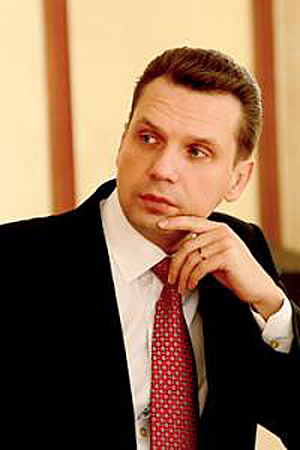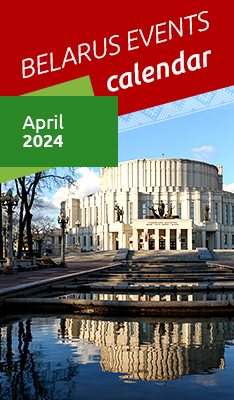Opinions & Interviews
Nikolai Shchyokin: Modernization and integration are essential for the Belarusian development model

MINSK, 8 August (BelTA) – Modernization and participation in integration processes are key components of the Belarusian development model. The opinion was voiced by Nikolai Shchyokin, Director of the Civil Service Institute of the Academy of Public Administration under the Belarus President, Assistant Professor, Candidate of Philosophy, member of the Public Council under the Interior Ministry.
“Many perceive integration as a purely foreign economy process, which is important only for export growth, expansion of risks, the creation of mutually beneficial trade regulations and so on. But it is but the tip of the integration idea. The Union State of Belarus and Russia, the Customs Union, the Single Economic Space signify the realization of Belarus’ historic role of a bridge between Europe and Asia. Integration is not something outside our economy but the essence of our entire development model. Only integration can ensure full modernization of the economy and the society to bring about radical changes of the entire life of our nation in addition to new technologies and new enterprises. It will allow Belarus to be a competitive state in the international scene,” stressed Nikolai Shchyokin.
In his words, today Belarusians witness and take part in large-scale integration processes in the Eurasian space and the processes influence many global development processes to a large extent.
“Belarus has always been a consistent adherent of Eurasian integration. Our country has honored its obligations involved in presiding over the Collective Security Treaty Organization. It would be no exaggeration to say that this organization is one of the main instruments to ensure security and stability in the entire post-Soviet space. Its role in the future will become more prominent due to the tougher competition in the international scene. During its presidency Belarus suggested several initiatives to improve the CSTO’s effectiveness, improve methods used to counteract challenges and threats, and reach accord between members of the organization. The adoption of the decision to set up a collective force to respond to emergencies in any CSTO member state in case of natural or man-caused catastrophes was one of the positive changes,” said the source.
Nikolai Shchyokin is convinced that Belarus’ present presidency in the Commonwealth of Independent States will give new incentives to the Commonwealth. “The Belarusian side has come up with an entire program of measures for this period to greatly enhance the international influence of this integration association. Belarus’ presidency uses the slogan: integration for the benefit of the man through stronger neighborly relations, the development of ecological cooperation, assistance to raising the availability of green technologies, and the expansion of the dialogue between cultures,” noted the expert.
Participation in the Single Economic Space and the creation of the Eurasian Economic Union in 2015 is an important avenue of Belarus’ policy. It will be accomplished without damaging the Union State of Belarus and Russia, Nikolai Shchyokin believes. The implementation of the integration project will quite probably turn into an influential center of international relations.
Speaking about modernization, Nikolai Shchyokin underlined that these processes now encompass not only the economy but the social and political system, too.
“Getting as many citizens as possible involved in social and political activities is the essence of this kind of modernization. It is the development of democracy not in words but deeds. Therefore, it is totally not necessary to build the chosen democracy type after a certain model, for instance, the North American one or the Western European one. The model should be determined by local conditions and historical factors. In other words, it is necessary to keep in mind not the democracy practiced by an individual country or a group of countries, but the set of principles and fundamental values that allow citizens to partake in running the country while simultaneously protecting them from arbitrary, beyond control actions of the government, business, and other forces that influence people’s lives,” he said.
“The development of the Belarusian democracy model is not stuck. It is in motion. Now we are talking about a new stage of democratization of the Belarusian political system, the construction of a state for people. The main indicators of the state for people is respect for human dignity, hard-working labor as the basis of a person’s prosperity, a fair social policy, lack of red tape, the construction of the Union State of Belarus and Russia. The state for people relies on historical ties through times, in other words, a harmonious combination of traditions and innovations. The state for people takes care of present generations and future ones, too. Thus, in the Belarusian democracy model the set of characteristics that qualify the state for people includes not only economic, political, and social indicators, but also spiritual, moral, and ecological principles,” Nikolai Shchyokin is convinced.
The so-called green economy plays a special part in it as transition to innovation-based manufacturing. “Moreover, they talk about creating an ecological civilization these days. Therefore, we cannot lag behind in creating a brand new type of manufacturing. It is necessary to use the available experience to create a green economy. Moreover, using this experience will require no special expenses. We talk about saving resources a lot but we don’t care about saving them all the time. But there is no need to think up new rules. One just has to save electricity, water, and paper. One has to calculate things. If everyone starts rationally using resources all the time, it will lead to major shifts in our conscience, leading towards the formation of ecological thinking,” stressed Nikolai Shchyokin.
“Small and medium business can play a large role in forming the green economy. You have to admit that our small and medium businesses rely largely on profiteering sales these days. But businessmen of this level can make a considerable contribution to the resolution of ecological problems by focusing, let’s say, on processing industrial waste and household waste. The problem of effective manufacturing should be tackled in a new way in view of the green economy, requirements can be met by spending as little energy and labor as possible in order to minimize the burden of mankind’s negative influence on the environment,” remarked the Director of the Civil Service Institute of the Academy of Public Administration under the Belarus President.
| Su | Mo | Tu | We | Th | Fr | Sa |
|---|---|---|---|---|---|---|







 print version
print version make home page
make home page add to bookmarks
add to bookmarks

